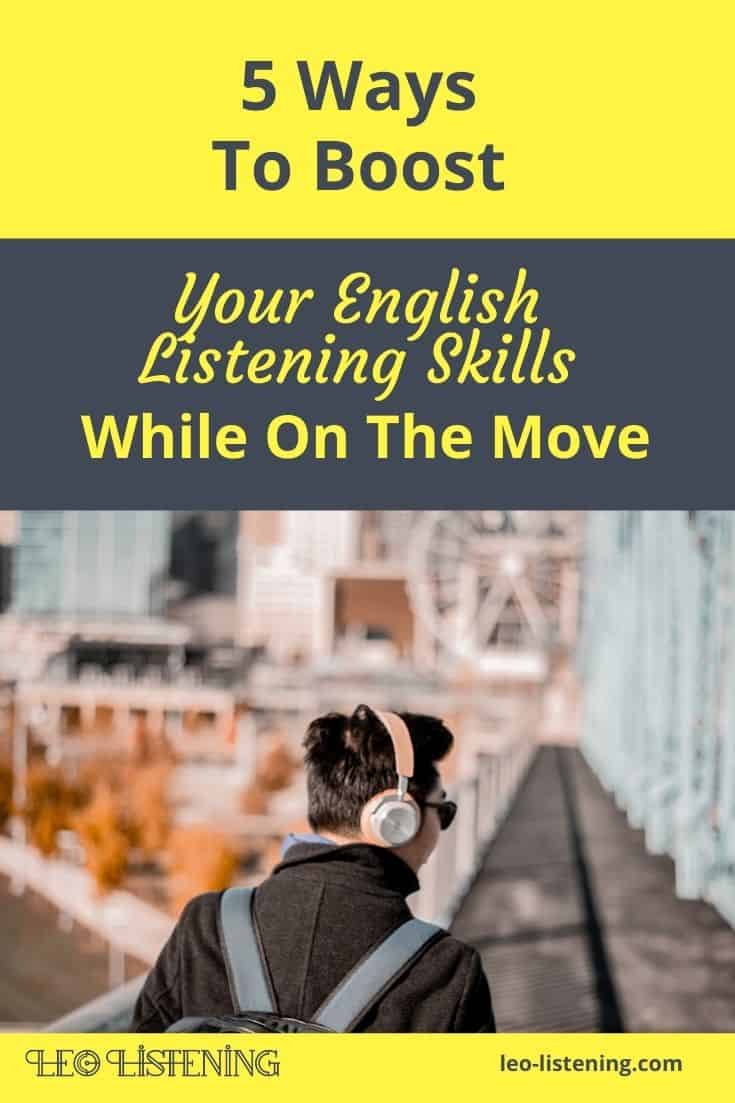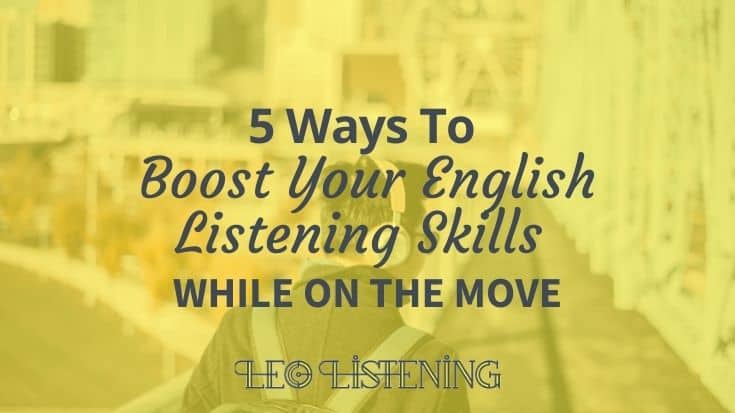Hello there Leo Listeners. It’s Cara here from Leo Listening, where I help intrepid travellers and adventurous expats connect in English through movies.
If you’re going on holiday, or you need to travel for work, you’re going to probably have a lot of time ahead of you, at least during the journey. So maybe you’ve got several hours in the car, a long flight, or time waiting at the airport.
It’s easy to complain about lack of time, but when you’re travelling, you have all this dead time that you can use if you’re prepared and you think about it beforehand.
Or even while you’re sitting by the pool on holiday.
I think listening is one of the easiest skills to work on during these travel periods when you’re on the move and you have this extra time that you need to fill.
So consider this your guide to improving your English listening skills while on the move.
I’m going to have a little chat with you about stuff you know, but it’s always good to have a reminder, isn’t it?
So we’re going to talk about:
- podcasts
- audio books
- social media
- YouTube
- and the classic pen and paper
and why all of these are useful for being on the move and for listening at the same time.
You can keep scrolling to read the blog post or press play on the video below if you prefer to watch the video version of the post.

Listening On The Move Tip #1: Podcasts
Podcasts are the obvious listening resource for people who travel. If you have a commute, you probably already listen to some podcasts as you do that.
As you know, or maybe you don’t, you need to have some kind of podcasting app on your phone to be able to download them. If you’ve got an iPhone, if you’re fancy, then there’s an application already built into it.
If you’re on Android or something else, you’ll need to download an app like Stitcher or Soundcloud. I’m going to add some links about this under the post for if you’re wondering what to do.
What’s really good about podcasts is that you can literally find them about any topic on Earth. You just need to do a bit of searching around. So just browse through the topics you’re into and listen to something that catches your attention. Here’s my selection of the 11 best advanced English podcasts.
If you’re feeling a bit less confident and you want to listen to something designed for English learners, there are some great podcasts out there like Luke’s English podcast, English Across the Pond, the Aussie English podcast – there’s loads of options.
Just a quick money-saving tip – if possible, especially for travelling, you want to download the podcasts to your phone so you’re not constantly streaming on the wifi or over 4G.
That could be a big problem when you’re travelling, because obviously when you’re abroad, I think most phone companies charge you extra if you use the internet while you’re away.
It depends on the data limit that you have with your phone. I have a crap data limit, so I have to make sure that I download everything, even when I’m at home.
So once you’ve got your podcast application on your phone and you’ve got some interesting podcasts downloaded, you can sit back and listen. But obviously here at Leo Listening it’s about not just listening.
There are lots of things that you can do to make your podcast experience more active and more useful.
- You can use a transcript if you’ve got one, either while listening or after listening.
- You can read the podcast show notes. So on the website of most podcasts, the show notes are a summary of the show.
- You can do things like write your own summary of the podcast after listening and compare it with the show notes. Then you can see if you missed anything, or maybe you wrote a better summary than the podcast creator!
- You can find a podcast partner. Then you can meet up to talk about the podcast that you’re listening to.
- You can talk about podcasts that you’re listening to with your teacher if you have one.
- You can record yourself speaking about the podcast that you’ve just listened to.
- You can write a review of the podcast in iTunes.
The possibilities of going beyond just listening and improving your overall English skills are endless.
Podcasts- love them!
Listening On The Move Tip #2: Audiobooks
Audiobooks – we’ve talked about them already on here. They’re a great way to catch up with your reading this summer. Instead of packing big, bulky books into your suitcase, just download a bunch of audiobooks, put them on your phone, and then you’re good to go!
You can obviously read along at the same time as you listen, if you have the paper book or the Kindle book.
Or, if you have the text, you can also choose some sections to do dictations with to make sure that you caught what was said, or whether you misheard or misunderstood anything.
If you’re using the Audible app, which I love, you can use all the little extra features like sleep mode, clipping and bookmarking. I go on about that in more detail in the post about audiobooks.
I think what’s nice about audiobooks or anything where the speech is a bit slower than usual is that you’re more likely to understand. And therefore you’re going to feel better about your listening and your English. I think that gives you the courage and the confidence to go into more difficult listening situations feeling a bit better about yourself.
It’s important to give yourself opportunities to feel good about your listening by listening to something easier. Then you are going to be more bold and audacious, and allow yourself to go into more difficult situations.
That’s how I see the psychology of listening to something more slow.
Listening On The Move Tip #3: Social Media
So I have deleted all the social media apps from my phone because I cannot use them in a healthy way. I will just mindlessly scroll through them all the time.
Maybe you’re more disciplined than me. I don’t know.
But I think they can be useful from a listening perspective.
For example, if you follow Facebook pages where the page creator shares a lot of video, that can be a great way to get a bit of short listening into your daily life.
Even if the page that you’re following doesn’t normally share a lot of video, you can click on the “video tab” on the page, and go and have a look at what videos are on there already. Is there something short that you can watch?
I have just discovered a really cool Facebook page called Script to Screen. The way that works is that they show you a movie clip and underneath, instead of subtitles, you have the actual movie script. So you see for example the stage directions and the dialogue.
Often news sites and things like this have a lot of video.
Also, Instagram is a good one for video because although some accounts are mostly pictures, there are some accounts where it’s more video. Again, you can find Instagram accounts about absolutely anything.
There are some specific language learning accounts, but there’s also a lot of stuff to do with fitness, fashion, interior design – all this kind of stuff that’s very visual.
Even if you’re following accounts on there that don’t tend to do video, I think a lot of people are doing video now in the Instagram stories part of the page. So that could be another option, and those videos are of course really short, so it’s not going to spoil your journey too much while you’re travelling and listening to them.
Listening On The Move Tip #4: YouTube
Another resource is YouTube.
Youtube is awesome for so many reasons, especially as a way to watch short films – well that’s one thing you can do. You can watch film clips or TV clips.
The subtitles give you an instant transcript, which is awesome. You just have to make sure you’re looking for accurate ones.
Again, a bit like with podcasts, you can extend and enrich your listening by doing some other things, either before or after listening.
- Once you’ve watched a video, you can leave a comment.
- You can write your own summary and then compare with the description under the video.
- You can share the videos with friends and discuss what you thought with them.
Again, there are loads of opportunities to not just listen, but also write, speak, read etc.
Listening On The Move Tip #5: Pen And Paper
Finally, I mentioned a non-tech tool: pen and paper.
I know, you could use the notes application on your phone, of course. But I think sometimes it’s nice to actually physically write. Sometimes we remember things better when we do that.
You can easily fit a pen and paper into your luggage. Even if you’re travelling. You don’t need to take a huge notepad or anything with you.
Why are these tools indispensable? Well, when you hear a new word while you’re listening, you can write it down.
If you really want that word to stick in your memory, you can make a sentence with the word.
The best thing to do is to make that sentence relevant to you an your life. You could even do some creative writing about it.
You can pick a tricky bit from what you’re listening to, try and write it down, and then compare with the original. That is called doing a dictation, and for me, that is the foundation of improving your listening.
You can write a summary of what you’re listening to – physically write it.
I mentioned leaving a comment on iTunes for podcasts, or a comment on YouTube for videos. You could just write that on paper. So even if you don’t publish it, the act of writing it makes you organise your thoughts about what you’ve just listened to and what you thought of it.
You can use pen and paper to reflect on your listening experience. I love doing this with my students when we work together. They write down how much they think they understood of the video, how they feel a few days after watching it, or how they feel after watching it again.
What’s improved? What’s still difficult? For me, that reflection part is a really important aspect of improving your listening. How you’re feeling, what’s improving, what do you still need to do?
Boost Your Listening On The Move
So hopefully that’s given you some ideas of what to put in your suitcase before you head off on your holidays and what you’ll need to maintain your English, maintain your listening practice, and fill all that time that you’re going to have ahead of you if you’re travelling.
I hope you enjoyed those tips!
Useful Links
- Podcasts apps for Android from Time magazine : http://time.com/5136033/best-podcast-apps-android-ios/
- Even more podcasting apps: https://www.tomsguide.com/us/pictures-story/555-best-podcast-apps.html#s20
- Luke’s English podcast: https://teacherluke.co.uk/
- English Across the Pond: https://www.englishacrossthepond.com/
- Aussie English: https://theaussieenglishpodcast.com/
- My interview with Annemarie on finding a podcast partner to chat to /improve-speaking-skills-podcast-partner/
- Script to Screen on Facebook: https://www.facebook.com/Script.to.Screeen/
- Now This News: https://www.facebook.com/NowThisNews/
- How to find accurate subtitles on YouTube: /5-minute-guide-youtubes-listening-secret/
- Interview with Trisha on creative writing: /films-creative/
